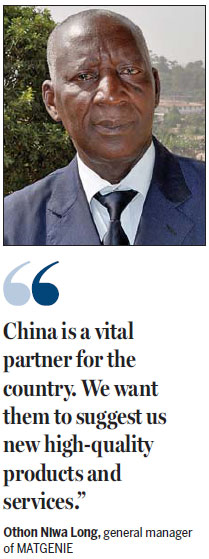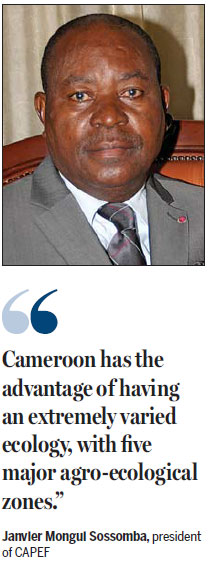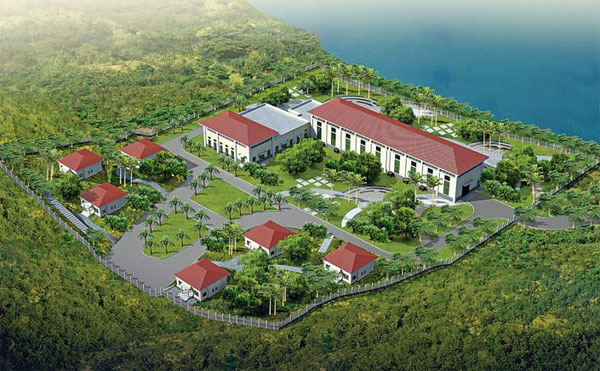Recruiting China to brew success
|
The Nachtigal water pumping station will bring 300.000 cubic meters of fresh water per day to Yaounde. Photos provided to China Daily |
Cameroon devoting more funds to industry, with new cacao and coffee development plan
Given its fertile soil and favorable crop-growing climate, Cameroon is a major producer and exporter of coffee and cocoa. Farmers produced a combined 200,000 tons of cocoa in 2015 and nearly 24,000 tons of coffee.
One of the few African producers of arabica and robusta beans, Cameroon counted China among its new export markets in 2015. By 2020, officials expect its network of farmers to grow a combined 600,000 tons of cocoa and 160,000 tons of coffee.
The Chamber of Agriculture, Fisheries, Livestock and Forest of Cameroon, known by its French acronym CAPEF, is comprised of experienced and dedicated professionals.
"China can do a lot for the Cameroonian agricultural sector because of its wealth of experience," said CAPEF President Janvier Mongui Sossomba. "We hope Chinese investors arrive and create agricultural industries that allow local farmers to train and adopt better farming practices. It would be a transfer of knowledge and organizational ability.
"China is already involved in our agricultural sector, particularly in rice production. Cameroon has the advantage of having an extremely varied ecology, with five major agro-ecological zones. We want to grow as much fresh produce as we can."
Up to 6 million people are estimated to rely directly and indirectly on cocoa and coffee production. Reliable and affordable equipment is highly desired by growers and industry chiefs see a range of openings for foreign businesses, particularly from China.
Thanks to a new cacao development plan launched in late 2014, more funds have been diverted to the sector to maximize its huge potential as well as add value and explore new international sales channels, including China.
The National Cocoa & Coffee Board, or its French acronym ONCC, aims to ensure the sector complies with national and international regulations, and guarantees and certifies their qualities. The public entity also promotes the "Cameroon" label.

"For years, African producing countries have been suppliers of cheap raw materials. If we manage to transform ourselves we can capture the added value at the source," said ONCC general manager Michael Ndoping.
Focus on quality
"There is an emphasis on quality, given the fact we are in a very competitive international market. Quality, both physically and chemically, is very important. Local transformation is also key as we currently transform less than 10 percent of our production. The target is to reach 40 percent. These are the main priorities in the agribusiness today in Cameroon."
For the past decade, the Development Fund for the Cocoa and Coffee Sectors, or its French acronym FODECC, has acted as a custodian of the industry. The public entity aims to guarantee the quality of both crops and increase their productivity and efficiency by providing the producers with equipment, pesticides and fertilizers. In addition, the organization invests heavily in research and development and provides training to producers.
"There are a number of factors that make Cameroonian cocoa very special, including the large size of the beans and the particularities of its color. The variety of cocoa we have in Cameroon cannot be found anywhere else," said FODECC Administrator Jean Marie Ndengoue Noumbissi.
"Manufacturers are conscious that producing is no longer enough to be competitive. We need to add value and transform the sector and so are interested in having a presence in high-price, high-quality markets."
Cameroon's cocoa industry continues to expand at a rate of 3,000 to 4,000 hectares of plantations every year, an impressive growth rate that involves existing players along with new entrants. The country has the capacity to plant 4 to 5 million hectares of cocoa, meaning the potential is huge. On a global scale, demand for this "black gold" outstrips supply by 1 million tons, meaning companies stand a good chance of reaping significant rewards on their investment.
Another hard-working public institution dedicated to improving the cocoa sector's fortunes and extending its reach both nationally and internationally is the Development Corporation of Cocoa, known by its French acronym SODECAO. The entity is the only supplier of crops - from which 5 to 6 million plants are produced every year.
New roads
"Cameroonian cocoa is one of the best in the world and is highly appreciated by chocolate makers," said Jerome Mvondo, general manager of SODECAO. "(Our main competitor) Ivory Coast is saturated, if it wants to plant new cocoa trees, it must destroy the existing ones first. On the contrary, Cameroon has plenty of virgin land for cocoa production. The only things that we are lacking are crops, but a partnership with Brazil will allow us to plant between 15,000 and 20,000 additional hectares every year. We can progress extensively and rapidly."
"Foreign investors are very welcome but must respect technical processes and only use the finest cocoa plants and be selective when it comes to clearing forests," Mvondo said. "Our sector is open to all kinds of international investors, big or small, willing to produce, transform and export cocoa from Cameroon. China is very welcome to join."
With a diverse topography that presents challenges for the transportation and distribution of crops and fresh produce that will perish if not stored promptly, the importance of a modern and efficient transport network and infrastructure to Cameroon's economic well-being cannot be underestimated.
Due to its geographic location, and given the fact that it borders a number of landlocked neighbors, Cameroon is a strategic country when it comes to the transport of goods within the region. Renewing and upgrading highways is essential if the country is to achieve its economic potential.
Established in 1967 and supervised by the Ministry of Public Works, MATGENIE owns and maintains the equipment needed to develop and upgrade the national road network. The firm aims to achieve a 20-30 percent share of the road maintenance market and 10-15 percent slice of the road construction market by 2018. Another target is the ownership of 1,500 engineering machines by 2020 - a twelvefold increase on its 2011 total - meaning there are significant opportunities for supplying equipment to MATGENIE.

"In any country, the road network is essential both for the economy and for the welfare of its inhabitants," said Othon Niwa Long, general manager of MATGENIE.
"We have a road network that allows for the transport of goods and people, but that still has a number of limitations such as it does not cover the whole country and is not in good condition.
"For the moment, our function is to acquire the appropriate equipment and to make it available for the contractors, but we will soon be active in the construction of roads. We have a good relationship with the Chinese technical and financial partners.
"China is a vital partner for the country. We want them to suggest us new high-quality products and services. In the field of civil engineering machines, for instance, they should focus on customer service."
With more than half a century of experience assisting and supporting investors, the Cameroon National Investment Corporation, or SNI as known by its French acronym, acts as the right arm of the country in the realization of all structuring and strategic investments.
The SNI provides investors with the support they need for the launch of projects, in the participation in viable projects and in the identification of investment opportunities. Last year, the firm completed a feasibility study into a major new technological and agro-industrial park at Edea. One of the focal points of the Vision 2035 development plan is the overhaul of the energy and electricity sector by public bodies, privately owned companies and international investors. Billions of dollars will flow into the industry for new hydroelectric plants, dams, networks and physical distribution channels.
One such example is the Lom Pangar Dam, construction of which has been entrusted to China International Water & Electric Corp. The showcase energy project is an example of how the collaboration between Chinese and Cameroonian entities can lead to tangible structures that improve the lives of millions of people.
"The Chinese have exceeded our expectations: they work hard, always meet all deadlines, and deliver high-quality outcomes," said Thodore Nsangou, general manager of project partner Electricity Development Corp. "Lom Pangar Dam is an example of an extremely high-quality project delivered on time.
"Investors succeed in Cameroon because there is a clear strategy to improve the business environment. Access to cheaper electricity allows for industries to flourish - it is a trigger for growth. The country is making efforts to improve legal frameworks and increase competitiveness. Also, Cameroonians are intelligent with an entrepreneurial mindset."
InFocus provided this story
(China Daily 04/11/2016 page7)



















